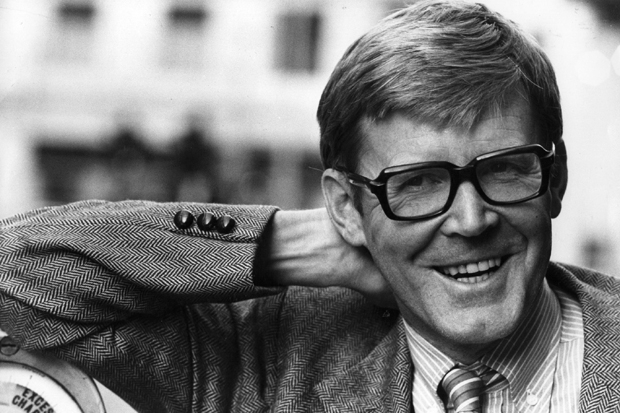‘So — take heart,’ said Alan Bennett, sending us out from his play, Cocktail Sticks, on a cheery note. The treatment for cancer had been gruelling, but that was 15 years ago, so…
This Radio 4 production was adapted (and produced) by Gordon House from the stage version at the National Theatre but was perfectly made for radio, a monologue interrupted by dramatic scenes that take us back into Bennett’s childhood. Why, he wonders, is there nothing from that past for him to write about — no trauma, no deprivation, no disappointment? Surely, his parents could have done more to help him become a writer?
With anyone else this would have sounded so trite and superficial, uncaring even, the typical writer turning over his own life, his own family for commercial gain. But with Bennett it becomes masterful, each fragment of memory telling us something not so much about his life as about the blanks in our own half-formed reflections. A plastic tube filled with cocktail sticks discovered in a kitchen cupboard after his mother’s death is the catalyst. After which Bennett comes to realise that perhaps nothing much happening in a life is a writer’s blessing: ‘The life you don’t have is as ample a territory as the life that you do.’
Bennett himself narrates, with Alex Jennings playing him as a child in a Leeds suburb, a bemused adolescent, at Oxford in the late Fifties, meeting the stars on Broadway, with his mother as she drifts away from life in the nursing home at Weston-super-Mare. The two voices segue seamlessly into each other so that it’s difficult to tell recreation from reflection. Bennett goes to the pictures as a boy and has an unfortunate encounter but there was nothing much to it, a leg fondled, a man trying to be friendly. Wryly, he suggests, ‘I had been damaged — and that was satisfying.’ Only Bennett could get away with it. The pregnant pause. That questing tone of voice.
A few years ago the writer Hilary Mantel was a successful but not a controversial novelist. Now the mere mention of her name can cause ructions in the establishment. I can’t help thinking it might be because she has dared to become our most original and accomplished writer. This week Radio 4 went ahead in spite of the furore and broadcast selections (produced by Elizabeth Allard) from her latest book of short stories entitled The Assassination of Margaret Thatcher and including the story that sent columnists in the Mail on Sunday and various other media organs into an apoplectic rage. How dare Mantel imagine a scene in which the PM was shot at by an IRA sniper?
The story was not published until after Lady Thatcher’s death, and almost a generation since her fall from power, but still it was deemed heretical. Her critics (who, one can’t help suspecting, would be applauding Mantel for her talent if her first name had been Martin rather than Hilary) tried to get the BBC to stop it being read on air, but common sense prevailed so that we were able to hear for ourselves that unlike Frederick Forsyth’s The Day of the Jackal Mantel’s story is less a thriller than a sly dig at politics and the belief systems that shroud Westminster. The assassin is ridiculous in his single-minded pursuit of a woman with metallic hair; the wealthy woman whose flat is taken over is as bitterly anti-Thatcher as the IRA mobster. With Mantel nothing is as it seems; dark undercurrents destabilise the seemingly secure. She knows her task as a writer is to make us think about things differently; to prod us into recognising that we don’t know. Harriet Walter read, catching both the blokey belligerence and the genteel barbs.
Correspondents Look Ahead (Radio 4) is an annual gathering of the BBC’s best journalists to discuss what they think might happen in the next 12 months. This year’s team included the great Bridget Kendall, Lyse Doucet, Carrie Gracie and Kamal Ahmed under the astute chairmanship of Mark Mardell. Their brief from producer Simon Coates was ‘to be interestingly wrong’ for after all how can you possibly predict the state of the world in January 2016 when no one last year foresaw Islamic State, Ebola, the Ukraine and Crimean crises, or the collapse in the price of oil. But guessing the future is not what made this programme so fascinating. No, it was the way the conversation roamed from the number of mobile phones in China to Putin’s problems in Russia via the falling price of copper and iron ore and whether or not the UK has been irrevocably damaged by the Scottish referendum.
There’s a delight in listening to experts given free rein to voice their thoughts beyond strict reportage, to discover that the danger for Russia now is that it could become ‘a Canada for China’, providing raw materials for Chinese growth, and that here in the UK we’re still, despite everything, the sixth largest economy in the world. How will the election affect this? None of them was prepared to say, but Ahmed ended the programme with great and uplifting conviction, ‘We will find a vaccine for Ebola.’






Comments